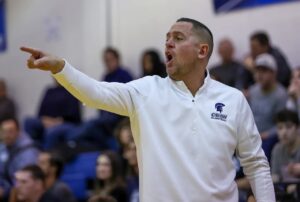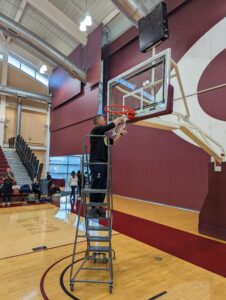Redefining Success: Todd McGuinness’s Journey from Hartwick to Historic Wins at Case Western

Case Western’s Todd McGuinness Earns 200 Career Victory Amid Program Turnaround & Case’s High Academic Standing to Land Impact Grad Transfers.
When Todd McGuinness left a decorated, successful career at Hartwick College to accept a new head coaching job at Case Western Reserve University in July 2016, he came into a position that had been accustomed to mediocrity.
Decades of data indicated the university would never be able to shake its reputation of failure. But since returning to a familiar place and taking the reins of the Spartans’ program, McGuinness and his teams have dramatically flipped the script.
Off to a 4-0 start this season as the No. 13 men’s basketball team in Division III, Case Western has ripped off 24 straight regular-season wins against non-conference opponents. Akron Massillon Jackson alum and Baldwin-Wallace graduate transfer guard Anthony Mazzeo is averaging 18.5 points per game, putting together a 25-point clutch performance at Denison University in a big overtime road win 80-78. And in the previous contest, he dropped 29.
The Spartans continue to build off the momentum of last year’s school-record-setting 22-4 campaign, back-to-back NCAA Tournament appearances and three straight winning seasons for the first time since leaving the Presidents’ Athletic Conference in 1983-84.
On Nov. 11 at Horsburgh Gymnasium for the second consecutive year, Case Western defeated Eastern University 82-72 to win the Bill Sudeck Tournament Championship. It was a milestone night for McGuinness, who recorded his 200th overall win as a head coach.
“I’ve been privileged to coach a lot of really good players. That’s number one. We all know that,” McGuinness said in an exclusive interview over the phone. “In basketball, you’re not gonna win by outcoaching people. You’re gonna win by having good players that are put in position to win games. Good players, good assistants that helped get those players.
“I’ve been doing it for a while now, but it got here quicker than I thought it would. At times, you think you’re never gonna get to that number and then someone’s like, ‘Oh, 300 will be quick.’ I don’t know because that seems like a long way away. But having good players and good assistants and being in good sports helps too. But it’s been great.”
McGuinness added that it’s been a whirlwind and he hasn’t had time to reflect on his accomplishment. When the Spartans won their next game at La Roche University in his hometown of Pittsburgh, Pennsylvania, he celebrated with his parents and friends, yet stayed focused on what’s ahead. He even joked following that 78-58 win: “Now we’re only 99 to 300.”
“I’ll forget about that number real quick. Let’s be honest, when you get that many wins, it’s longevity too,” McGuinness said. “Being able to stay in the business and being able to coach for 14 years as a head coach, sometimes that doesn’t happen in places.”
Despite an unbeaten start, McGuinness admits that this version of the Spartans is unique compared to past iterations. He’s still figuring out who to play, who to put on the floor together and how to allocate the proper amount of minutes to his guys. Last year, they had essentially a seven-man rotation. This season, McGuinness speaks highly of Case Western’s depth, proposing the team can play anywhere from nine to 12 players on any given night. A lot of “new” to get used to.
“The best comparison’s probably being like a G League coach where you get all these guys thrown at you and you don’t have that much time to formulate and get ’em on the floor. That’s what I feel like right now,” McGuinness said. “We’ve got all these new guys thrown at us and we’re trying to assimilate and get everyone together. There’s not much time, and all of a sudden, you’re playing games.
“I think it’s a work in progress, which I like as a coach. It’s like every day is a new challenge and refreshes you a little bit. Every practice, we’re trying to figure out exactly what we want to do and figure out who needs to go in and trying to figure out exactly what works for this team. It’s different than what worked last year and it’s different from what worked the year before.”
Foundations of Success: The Influential Figures and Milestones in Todd McGuinness’s Coaching Career

In addition to the countless number of players who have steered him toward success, McGuinness appreciates his parents for supporting his passion for coaching. He also maintains a great relationship with upstate New York basketball coaching great Nicholas Lambros, who he credits for being a critical influence on his career and continues to stay in touch with today.
“He’s 85 now and he has the energy of a 30-year-old. He’s nuts,” said McGuinness, who met Lambros while coaching at Hartwick from the late 2000s until the mid-2010s. “He’s coached forever. He would sit on my bench. He would sit next to me every game when I first got in as head coach. I don’t think I’m where I’m at now, I’m not here without him helping me coach, figure out what to do. Stuff we still run is stuff that he ran.”
(A note on how small the basketball world truly is: Lambros originally was an assistant for Roy Chipman at Hartwick before taking over as head coach from 1977-1998. Chipman’s coaching tree includes Lambros, as well as John Calipari, Seth Greenberg and Bruiser Flint when Roy was at Pittsburgh in the 1980s.)
After McGuinness finished his playing career at West Virginia’s Bethany College in 2002, McGuinness helped assist at Hartwick in the 2003-04 season. He went on to hold similar associate positions at Vassar College in Poughkeepsie, New York and at Case Western from 2006-09, where he was the head coach for the first time with the Spartans’ junior varsity team.
Hartwick is where McGuinness earned his reputation as a program changer. Used to consistent success and NCAA Tournament appearances, the Hawks took a downturn when Lambros stepped away as head coach in the late 1990s. Even when McGuinness was there for a brief moment early as an assistant, it was among the poorest seasons in the university’s history.
So when he went back to Hartwick as a first-time varsity head coach in 2009, with only one winning season at that point since 1995, McGuinness had to restore a once-elite program to its expected standard. He was 28 years old and felt the pressure. Through it all, however, he was able to get the job done over time.
“We were able to recruit. We got the all-time leading scorer and rebounder in our school history the next year [Jared Suderley]. We were able to get a transfer too that helped us. We just started rolling and then we were the team to beat. It was a small college. I had a great time there. It was a great experience, made a lot of great friends.”
Following an impressive run where he won Empire 8 Coach of The Year (2011-12) and the third-most games in the school’s history (114-72) while guiding the Hawks to three Empire 8 conference championships and four NCAA Tournament berths, McGuinness sought after returning to Cleveland in 2016.
Balancing Academics and Athletics: Coach McGuinness’s Journey with Case Western Basketball
An avid boater, McGuinness was drawn to living in a city with a big body of water. He also already knew of Case Western’s respected academic reputation, meaning student athletes would be focused on their grades and the sport they played above all else.
“Our guys are here for school. They come in here because they’re going to a top-30 private research university in the country, but also they’re here because they love basketball. School’s 1A and basketball’s 1B,” McGuinness said.
“Our guys are in the gym all the time. They’re putting in just as much work as the guys at Cleveland State and maybe some of the guys with the Cavs. Their summers, they’re working to get better. Instead of having all day to do stuff, they might be in a computer science class or an engineering class, then they get in the gym right after that ends.”
Once again, though, McGuinness had work to do with a hoops team that had historically struggled.
Even with signs of early progress — particularly a win over sixth-ranked Rochester in his first season and then a five-game University Athletic Association winning streak in his second — it wasn’t until a lost season that the Spartans really took off.
McGuinness will never forget that moment. He was sitting in the middle of Lake Erie during the coronavirus pandemic when he learned of the NCAA’s graduate transfer rule. Immediately, he picked up the phone to call a coach at another four-year school to ask if his son would play for the Spartans, who had a grad program and an extra season of eligibility to offer. Once McGuinness found that option as a recruiting pitch, it opened the floodgates of possibility.
“I think it was just a niche that we never had here as a program,” McGuinness said. “We get here [in 2020-21] and it started turning. You could see it. We got some new life in here. We got some guys that, one game as grad guys, and you’re like, ‘Oh yeah, we’re gonna be pretty good.’ And we went to the Sweet Sixteen that year and then last year we won the UAA for the first time in our school history.
“The crazy thing is we went from never being able over .500 in our conference; 6-8 was the best record in our school history. And then, the year after COVID, we went 9-5 in the conference. And then last year, we went 11-3 and won the UAA. I looked down there and there’s two banners on the wall. When I got here, I thought I was never seeing another NCAA Tournament again, and now, it’s expected. I’d tell people, ‘Woah, woah, let’s remember the past’ (laughs). But it’s been great. I think it just shows you that good players go a long way. That’s the main thing. We were able to get some good players and then formulate ’em.”
The more he’s coached, the calmer McGuinness has become too. Once self-described as “a maniac” who “probably put miles on” roaming the sidelines, you’ll now find him sitting often and offering encouragement more than scolding his players as he might have before. McGuinness shares that his practices are even a little lighter than they used to be because the games carry more weight. It’s just adapting to the times and understanding that players want to win just as much as he does. That’s why they’re there.
“We kinda know when to push ’em and when not to,” McGuinness said. “These kids are trying their hardest and I don’t need to be all over ’em all the time. I think that’s really helped our guys play better too. I still get mad at guys, but I’m pretty calm. Whatever you see in practice you pretty much see in games. I still get after the refs. They drive me nuts, but that’s everyone.”
Transitioning from player to assistant to head coach, McGuinness feels his perspective from all angles has helped him connect on a deeper level. Maintaining relationships is the most important thing to do in each position, no matter how the responsibilities change. Tougher conversations have to be had as a head coach, as well as more of the management side.
There’s also one major lifestyle change that’s part of the job that nobody talks about.
“When games start, my sleep goes to hell,” McGuinness said with a chuckle. “Your sleep pattern changes once the season starts. Especially after wins, you’re so juiced up. It’s hard to sleep. And then the next day you’re up and ready to go and you’re like, ‘Oh my god, I need to go back to bed.’
“The main thing I try to tell guys when they want to get into looking at being a head coach, I’m like, ‘Make sure you figure out your sleep pattern ’cause it’s gonna change.’ You’re gonna have a lot of energy after some wins that you never knew. The win as a head coach feels like when you’re a player. When you’re an assistant you’re still excited, but once it’s your own program, it goes back to the joy you felt as a player when you win games. That’s a pretty special feeling.”
Coach McGuinness’s Vision: Building a Division III Basketball Powerhouse at Case Western

Asked about his goals, McGuinness is somebody who lives in the present and doesn’t look ahead. He enjoys coaching the Spartans and loves being involved in Division III basketball, noting how talented the players are and how competitive the games can be.
“We have a unique conference. It’s the Ivy League of schools and ACC of basketball. We had five out of eight teams in the NCAA Tournament last year. I think right now our conference [UAA] in the first week, it’s 20-2 or one loss or something like that as a conference. So it’s insane,” McGuinness said. “Especially in Ohio, you think about the OHC and the NCAC. John Carroll right up the road and Mount Union real close. There are some really good players that either were Division I players or had opportunities to play Division I.
“We have probably two or three guys on our team that have had multiple Division II offers that just were like, ‘I’m gonna go to a great academic school over taking a scholarship.’ I tell people all the time if you come to our games and our conference games, you’re gonna see something, a dunk or two that you’re gonna be like, ‘What just happened there? What am I watching?’ I think when people actually come to games at Division III, they’re like, ‘Oh my gosh, I’d rather go watch this game than watch a Division I game.’ It’s 90-88 and it’s up and down. Everyone’s talented, everyone’s shooting.”
While he doesn’t downplay the differences in size and athleticism, he points out the amount of skill level being at “an all-time high.”
“You think about Duncan [Robinson]. Duncan started out playing Division III. There’s other guys. Even [Max] Strus, he played Division II to start. He was at Lewis. He was at Division II then came up,” McGuinness said.
“I don’t worry about our guys trying to play overseas. Our guys are going to become doctors. One of our best players last year, he had a year to come back, but he got a job at Rolls Royce working in propulsion. So that’s gonna trump coming back for a grad year, I get that.”
McGuinness wants to build a consistent national powerhouse at Case Western. He is a Pittsburgh guy who enjoys living in Cleveland. When he’s not busy recruiting, he gets to enjoy his summers and take in life. Being a head coach of a basketball team, it’s a pretty good gig.
“If you look at the coaches in our conference, there’s only eight of ’em. No one leaves. Everyone usually keeps these jobs forever ’cause you get to live in a major city and coach high-academic kids and pretty good players,” McGuinness said.
The 4-0 Spartans will have a nine-day break before hosting Capital University to continue non-conference play.
Until then, only 98 to 300 now, coach.
Spencer Davies: A Decade of NBA and Cleveland Cavaliers Coverage
Spencer Davies has covered the NBA and the Cleveland Cavaliers as a credentialed reporter for the past eight seasons. His work has appeared on SI Media Group’s Cavs Insider, Basketball News, Bleacher Report, USA Today, FOX Sports, HoopsHype, CloseUp360, FanSided and Basketball Insiders among others. In addition to his work in journalism, he has been a senior editor, a digital production assistant, social media manager and a sports radio anchor and producer.

